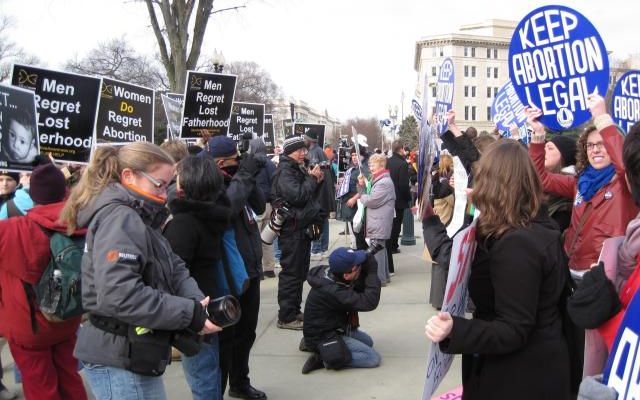To Achieve Social Peace, Overturn Roe

David has made what I think is an interesting analogy about abortion but I think follows the wrong path. He has taken lumps on comparing drink to feticide but the main point needs to be addressed, is abortion comparable to drink or to slavery?
David says we won’t have a war over abortion which I think and hope is true, but the reason we had a war over slavery is that there was an intransient group that was unwilling to allow its preference for slavery to be worked out by the normal politics of America. One side had its views constitutionalized and the other saw the mildest steps-say preventing slavery’s spread-halted by the Court.
The comparison of pro-lifers to “drys” strikes me as hilarious. The chief opponent of Roe v. Wade from the day it was announced was the Roman Catholic Church. As Hillarie Belloc famously wrote "Wherever the Catholic sun does shine, there's love and laughter and good red wine." It was not simply that ethnic groups opposed to Prohibition were Catholic but the Church itself uses wine in its chief sacrament. (I will never forget my shock at learning that Protestants often use grape juice in place of wine in church.) The Protestant churches, both low church and high church were far more united for Prohibition than they ever been against the legalized termination of unborn life.
David makes a first category error on the morality abortion. Comparing it to drinking or smoking is wrong because neither involves the killing of another human being.
Second, the founding document of the United States of America does not say “We hold these truths to be self evident, all men need a snootful now and again.” What it does say is “We hold these truths to be self-evident. That all men are created equal. That they are endowed by their creator with inalienable rights. That among these rights are Life, Liberty and the Pursuit of Happiness. That to secure these rights Governments are instituted among men….” A propositional nation, like the United States, is always going to have as a political issue any exclusion of innocent human life from the protections of the laws.
But David is absolutely correct in one aspect of the prohibition analogy that I think needs to be fleshed out. If abortion ceased to be constitutionalized by Roe v. Wade it would cease to be a major issue because it would return to the realm of regular politics.
There is one thing driving the abortion fight has almost nothing to do with abortion. It is the Court’s removing from pro-lifers the ability to participate in self-government. On this issue no polity has ever produced a constitutional amendment-a “Though shall not legislate against abortion” amendment. This has deformed American politics for two generations now.
If tomorrow the Court wrote it was out of the business of striking down abortion laws the following would occur: about thirty states would have laws more protective of the unborn within a year. None of the states would make the mother of the unborn child criminally liable for abortion. A dozen more would have parental consent, notice laws and bans of abortion in the last three months. Eight or so, including New York and California would have virtually no restrictions and indeed encourage them in many circumstances. On the federal level eventually there would be no payments to fund abortion. There might also be an effort to make sure no state could force a practitioner or entity to perform them.
There would be a perennial effort to get a human life amendment passed that would go nowhere (I am against such an amendment because it would return the matter to the Courts who are unfit to handle it). The “abortion wars” would be returned to the states and played out on the margins. Over time the country would become more pro-life as those states where abortion was encouraged and defended become even less likely to produce children both because of abortion itself but even more the workings out of the cluster of ideas about family and children that surround liberalized abortion laws.
Europe is a place where Christianity is nearly dead. It has a feeble pro-life movement outside Ireland and Poland. But almost every European country has laws far more protective of unborn life than the U.S. does. This is because the Courts have not taken the lead there on abortion law and because those nations are not “propositional” nations but ethnographic/historical entities.
The “prohibition” analogy works differently than I think David intends. One sides failed experiment in constitutionalizing the issue was rejected and repealed and the matter returned to the states. This caused social peace. The same is true here. One day the party that Constitutionalized abortion will lose the Court. On that day the abortion wars as a national issue will end.

